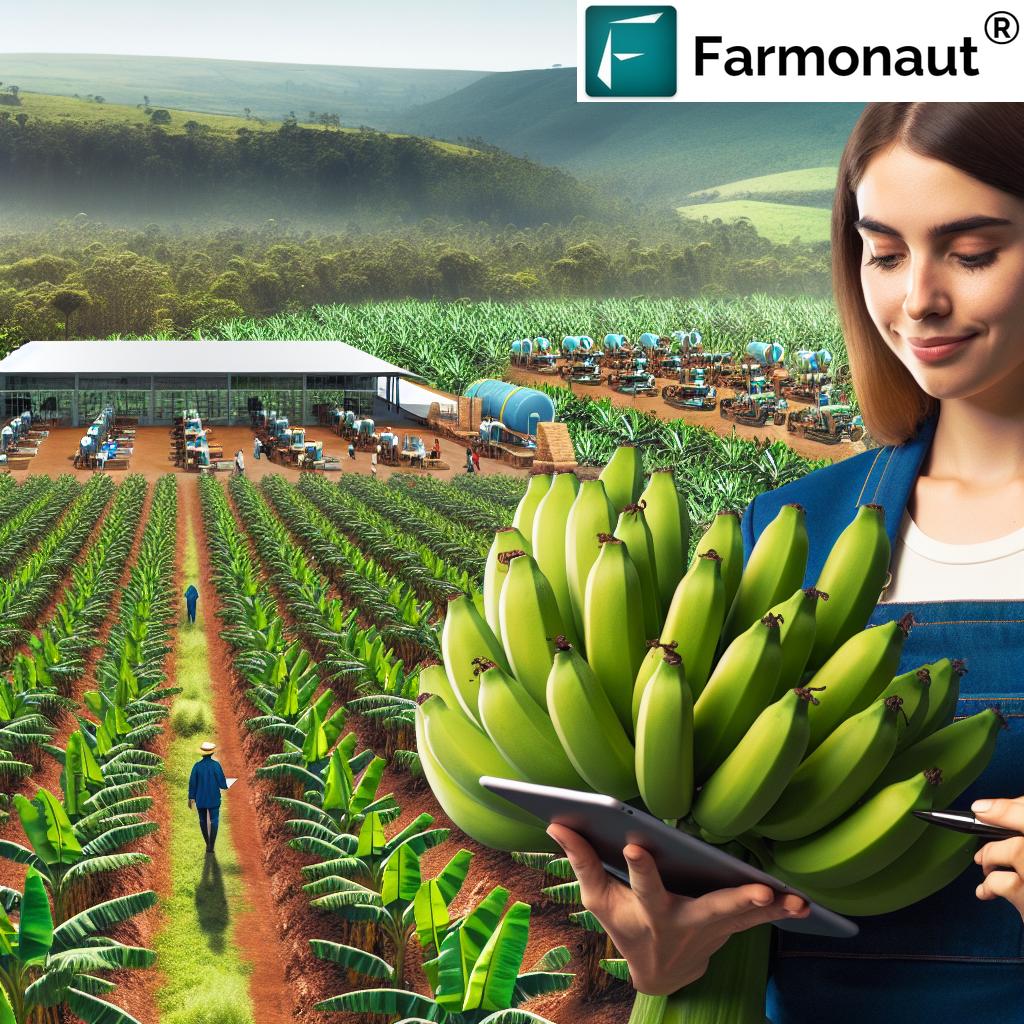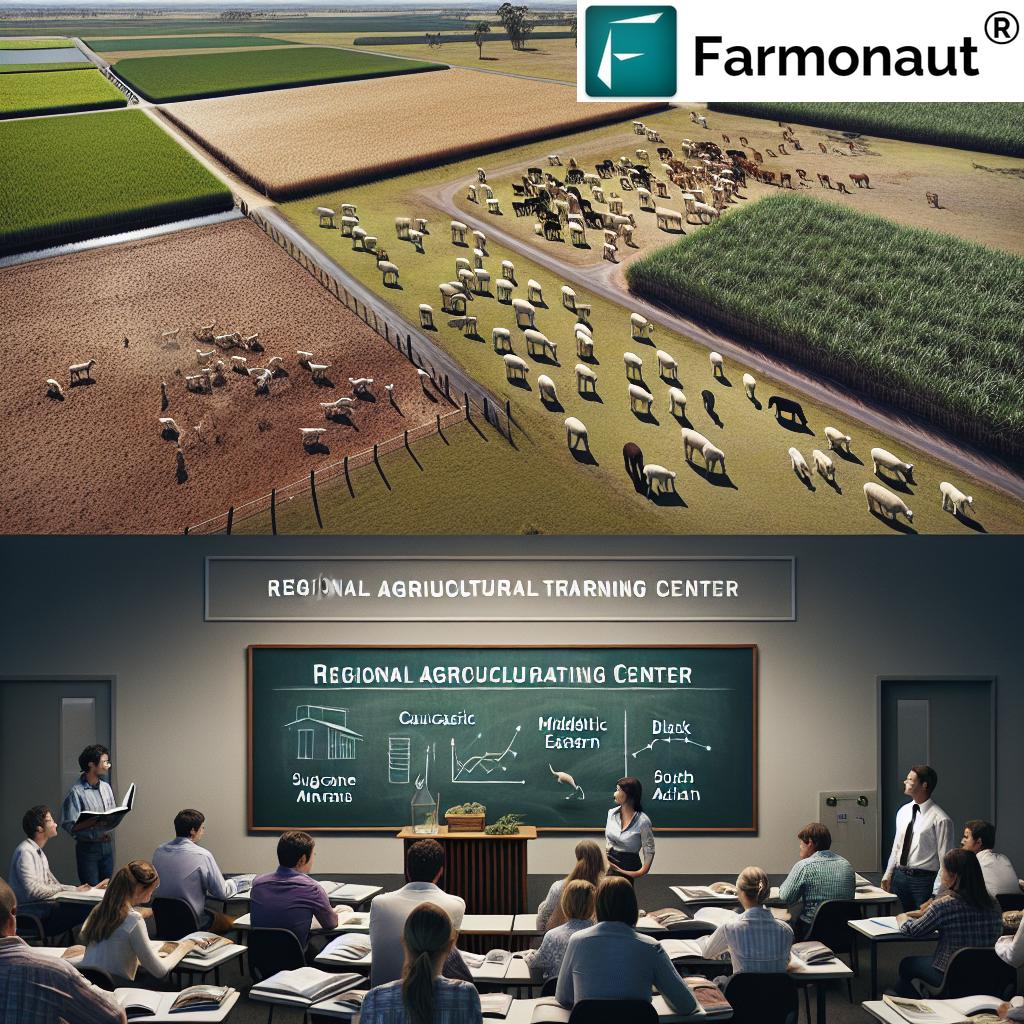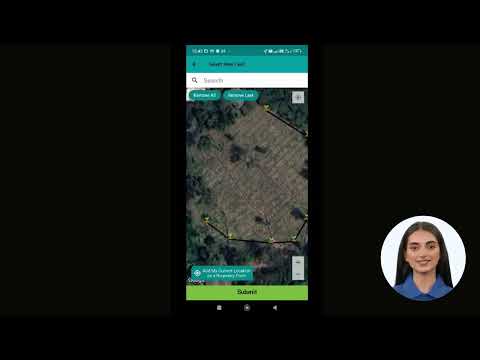From Bank Teller to Banana Farmer: Unlocking Agricultural Education Opportunities in Rural Queensland
“Australia’s wettest town, home to banana and sugarcane farming, receives over 4,000mm of annual rainfall.”

Welcome to our journey through the lush landscapes of rural Queensland, where we’ll explore the inspiring transformation from bank teller to banana farmer. We’re about to embark on an exciting adventure into the world of agricultural education opportunities and the vibrant farming community that’s shaping Australia’s future. So, grab your gumboots, and let’s dive in!
The Call of the Land: Emily’s Story
Meet Emily Probitts, a former bank teller from Brisbane who heard the call of the land. Tired of the city hustle, Emily yearned for a life more connected to nature and decided to pursue her dream of becoming a farmer. But where does one start when switching from spreadsheets to seedlings? That’s where our tale of rural farming scholarships and agricultural transformation begins.
Emily’s journey led her to Tully, Queensland’s wettest town and a hub for banana and sugarcane farming. With an average annual rainfall of over 4,000mm, Tully offers the perfect climate for these crops to thrive. But Emily soon realized that passion alone wasn’t enough – she needed the right skills and knowledge to succeed in this new venture.
Cultivating Knowledge: Agricultural Education in Rural Queensland
As Emily began her research, she discovered a wealth of agricultural education opportunities right in her backyard. Rural Queensland boasts a variety of institutions offering courses and training programs designed to equip aspiring farmers with the tools they need to succeed. From vocational education to university degrees, the options are as diverse as the crops grown in the region.
- TAFE Queensland: Offering hands-on vocational education in agriculture
- University of Queensland: Providing advanced degrees in agricultural science
- Rural Skills Australia: Facilitating on-farm training and apprenticeships
Emily opted to start with a Diploma of Agriculture at TAFE Queensland, which provided her with a solid foundation in farm management, crop production, and sustainable farming practices.
Embracing Technology in Modern Farming
As Emily delved deeper into her studies, she realized that modern agriculture is as much about technology as it is about tilling the soil. This is where innovative solutions like Farmonaut come into play. Farmonaut offers advanced, satellite-based farm management solutions that can revolutionize the way farmers work.
Check out Farmonaut’s web application:
With Farmonaut’s tools, farmers like Emily can monitor crop health, track soil moisture levels, and make data-driven decisions to optimize their yields. It’s precision agriculture made accessible, even for those just starting their farming journey.
Sustainable Agriculture Practices: The Future of Farming
One of the key aspects Emily learned during her agricultural education was the importance of sustainable agriculture practices. In a world facing climate change and resource scarcity, it’s crucial for farmers to adopt methods that protect the environment while ensuring food security.
Some sustainable practices Emily incorporated into her banana farm include:
- Integrated pest management to reduce chemical use
- Cover cropping to improve soil health
- Precision irrigation to conserve water
- Composting to recycle organic matter
These practices not only benefit the environment but also help to reduce costs and improve crop quality – a win-win for farmers and consumers alike.
Beyond Bananas: Diversifying Agricultural Skills
While Emily’s focus was on banana farming, her agricultural education opened her eyes to the diverse world of Queensland agriculture. From sugarcane farming to cattle and alpaca management, she discovered that rural Queensland offers a wealth of farming opportunities.
“Queensland’s agricultural industry contributes approximately 3% to Australia’s GDP, employing over 300,000 people.”
This diversity not only provides economic stability for the region but also offers exciting prospects for those looking to explore different aspects of agriculture. Emily found herself fascinated by the possibility of integrating livestock into her farm, considering the benefits of mixed farming systems.
Agribusiness Training: From Farm to Market
As Emily’s knowledge grew, so did her ambitions. She realized that successful farming isn’t just about growing crops – it’s about running a business. This led her to explore agribusiness training courses that would equip her with the skills needed to manage finances, market her produce, and navigate the complexities of the agricultural industry.
Emily enrolled in a series of workshops offered by the Queensland Agriculture Workforce Network (QAWN), covering topics such as:
- Farm business planning
- Financial management for agriculture
- Marketing and branding for farm products
- Supply chain management
These courses provided Emily with a holistic view of the agricultural sector, preparing her for the challenges and opportunities that lay ahead.
The Rise of Remote Agricultural Careers
One of the most exciting developments Emily discovered during her journey was the emergence of remote agricultural careers. With advancements in technology and connectivity, many agricultural roles can now be performed from anywhere in the world. This opens up new possibilities for those who want to contribute to the sector without necessarily living on a farm.
Some remote agricultural careers Emily found intriguing include:
- Agricultural data analyst
- Remote farm manager
- Agtech software developer
- Virtual agricultural consultant
These roles showcase how the agricultural industry is evolving, blending traditional farming knowledge with cutting-edge technology and digital skills.
Overcoming Challenges: The Role of Community
Emily’s journey wasn’t without its challenges. From adapting to the physical demands of farm work to navigating the complexities of agricultural regulations, there were many hurdles to overcome. However, she found strength and support in the tight-knit farming community of rural Queensland.
Local farming groups, mentorship programs, and community events played a crucial role in Emily’s success. These networks provided:
- Practical advice from experienced farmers
- Emotional support during tough times
- Opportunities for collaboration and resource sharing
- A sense of belonging in her new rural life
Emily’s experience highlights the importance of community engagement in regional areas, especially for those new to farming.
Innovation in Agricultural Education
As Emily progressed in her agricultural journey, she witnessed firsthand the innovative approaches to learning that are transforming agricultural education. From virtual reality simulations of farm operations to online courses that connect students with experts worldwide, the landscape of agricultural training is rapidly evolving.
One tool that caught Emily’s attention was Farmonaut’s mobile app, which offers tutorials on interpreting satellite data for agriculture. This kind of technology-driven learning is making advanced agricultural techniques accessible to farmers everywhere.
Download Farmonaut’s mobile apps:
The Future of Agriculture in Queensland
As Emily looks to the future, she’s excited about the prospects for agriculture in Queensland. With climate change presenting new challenges, the industry is adapting through research, innovation, and sustainable practices. Some areas of growth include:
- Vertical farming in urban areas
- Precision agriculture using drones and AI
- Carbon farming and regenerative agriculture
- Sustainable water management techniques
These advancements not only offer opportunities for increased productivity but also align with growing consumer demand for sustainable and ethically produced food.
Scholarships and Financial Support
One of the key factors that made Emily’s transition possible was the availability of rural farming scholarships and financial support programs. These initiatives are crucial in removing barriers to entry for aspiring farmers and supporting the next generation of agricultural leaders.
Some notable scholarship opportunities include:
- Rural and Regional Enterprise Scholarships
- AgriFutures Horizon Scholarship
- Nuffield Australia Farming Scholarships
- Various industry-specific bursaries and grants
These programs not only provide financial assistance but also offer networking opportunities, mentorship, and exposure to cutting-edge agricultural practices.
Essential Farm Management Skills
Through her education and hands-on experience, Emily identified several key regional farm management skills that are essential for success in modern agriculture:
- Financial planning and budgeting
- Risk management and contingency planning
- Sustainable resource management
- Technology adoption and digital literacy
- Marketing and value-adding strategies
These skills form the foundation of successful farm management, enabling farmers to navigate the complexities of modern agriculture while building resilient and profitable enterprises.
The Role of Technology in Modern Farming
As Emily’s farm grew, she increasingly relied on technology to optimize her operations. Tools like Farmonaut’s satellite-based crop monitoring system became indispensable for making informed decisions about irrigation, fertilization, and pest control.
Explore Farmonaut’s API for custom agricultural solutions:
Farmonaut API
API Developer Docs
By integrating these technologies, Emily was able to:
- Increase crop yields while reducing input costs
- Respond quickly to potential issues like pest infestations or nutrient deficiencies
- Improve the overall sustainability of her farming practices
- Make data-driven decisions for long-term farm planning
Connecting Farm to Table: The Importance of Agricultural Education
As Emily’s farm flourished, she realized the importance of educating consumers about where their food comes from. She began hosting farm tours and participating in local farmers’ markets, sharing her knowledge and passion for sustainable agriculture with the community.
This connection between farmers and consumers is vital for:
- Building trust in the food system
- Promoting understanding of sustainable farming practices
- Encouraging support for local agriculture
- Inspiring the next generation of farmers and agricultural professionals
Through these efforts, Emily not only grew her business but also contributed to the broader goal of creating a more informed and engaged public when it comes to agriculture and food production.
Agricultural Education Pathways in Rural Queensland
| Education Type | Duration | Key Skills Learned | Career Opportunities |
|---|---|---|---|
| Vocational Courses | 6-12 months | Crop Management, Livestock Handling | Farm Manager, Agricultural Technician |
| Agribusiness Training | 3-6 months | Financial Planning, Marketing | Agribusiness Consultant, Farm Business Manager |
| On-Farm Apprenticeships | 2-4 years | Practical Farming Skills, Equipment Operation | Skilled Farm Worker, Farm Supervisor |
| University Degrees | 3-4 years | Advanced Agricultural Science, Research Methods | Agricultural Scientist, Agronomist |
Embracing the Future of Agriculture
As we conclude our journey through Emily’s transformation from bank teller to banana farmer, it’s clear that the world of agriculture is full of opportunities for those willing to learn and adapt. The combination of traditional farming wisdom with modern technology and sustainable practices is paving the way for a bright future in rural Queensland and beyond.
Whether you’re considering a career change, looking to expand your agricultural knowledge, or simply interested in where your food comes from, there’s never been a better time to explore the world of farming. With resources like Farmonaut making advanced agricultural techniques accessible to all, the barriers to entry are lower than ever.
So, why not take the first step on your own agricultural adventure? Who knows – you might just find yourself trading in your desk job for a life among the banana trees, just like Emily did!
FAQ Section
Q: What educational qualifications do I need to start farming in Queensland?
A: While formal qualifications aren’t always necessary, a Certificate III or IV in Agriculture from TAFE or a similar institution can provide a solid foundation. Many successful farmers also learn through hands-on experience and short courses.
Q: Are there scholarships available for agricultural education in rural Queensland?
A: Yes, there are several scholarships available, including the Rural and Regional Enterprise Scholarships and industry-specific grants. Check with local agricultural organizations and educational institutions for current opportunities.
Q: How can technology like Farmonaut help small-scale farmers?
A: Farmonaut’s satellite-based farm management solutions can help small-scale farmers monitor crop health, optimize resource use, and make data-driven decisions, ultimately improving yields and reducing costs.
Q: What are some challenges faced by new farmers in rural Queensland?
A: Common challenges include access to land and capital, adapting to climate variability, understanding complex regulations, and developing necessary business skills. However, support networks and educational programs are available to help overcome these obstacles.
Q: How can I gain practical farming experience before starting my own farm?
A: Consider options like farm internships, WWOOF (Willing Workers on Organic Farms) programs, or apprenticeships. These provide hands-on experience and valuable insights into daily farm operations.







